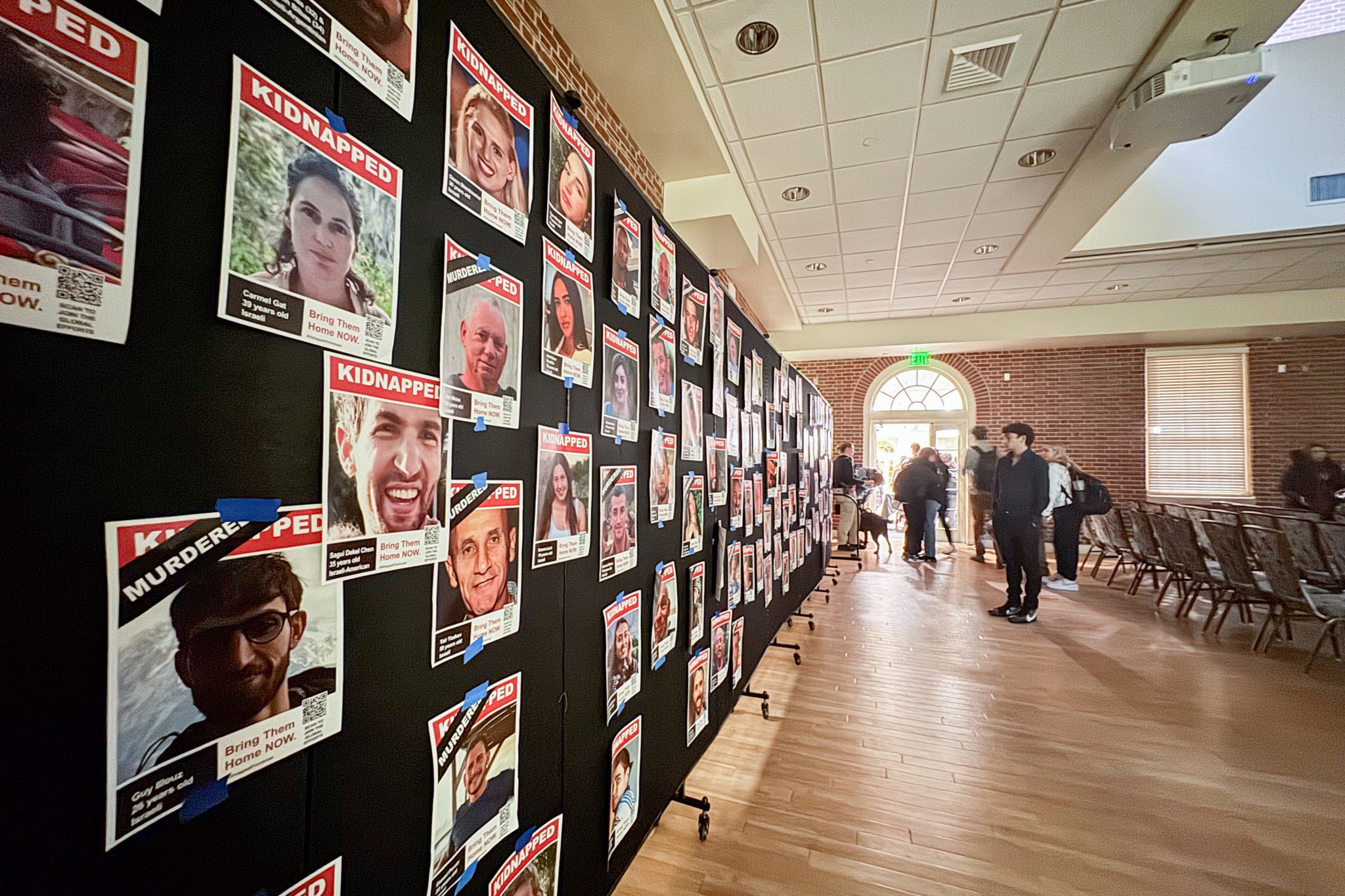By Sam Gauntt and Natalie Weger
About 80 University of Maryland community members attended a documentary screening Tuesday about the Oct. 7, 2023, Hamas attack on the Tribe of Nova music festival in southwest Israel.
Maryland Hillel, Terps for Israel and UMD Mishelanu hosted the screening in Stamp Student Union. The Embassy of Israel to the United States also helped sponsor the event. The documentary, Supernova: The Music Festival Massacre, featured footage and interviews with people who survived the attack at the festival.
“Just picturing my cousin in those places, in those situations is also a scary, scary thought for me,” Eytan Pomper, a junior kinesiology major whose cousin was taken hostage at the festival, said. “But I think it’s important that these films are shown and seen.”
Pomper started wearing a strand of tape on his shirt 100 days after the Oct. 7 attack. Each day, he adds another strand to mark how long it has been since Hamas took his cousin hostage. Tuesday marked 178 days. Pomper said he and his family do not know if his cousin is alive.
Hamas took about 250 hostages and killed at least 1,200 people in the Oct. 7 attack, according to the Associated Press. Some of those hostages were taken from the Tribe of Nova music festival, the Associated Press reported. Hamas killed at least 364 people at the festival during the attack, the Associated Press reported.
The attack on about 3,500 people enjoying the festival was “believed to be the worst civilian massacre in Israeli history,” the Associated Press reported in October.
[Elected officials urge Prince George’s County to support a ceasefire in Palestine]
On Oct. 8, Israel declared war on Hamas, according to the Associated Press. More than 32,000 people in Palestine have been killed since October, the Associated Press reported Tuesday. About 100 Israeli hostages remain in Hamas’ captivity, the Associated Press reported Wednesday.
The documentary was released in the United States in February and produced by Israeli filmmaker Duki Dror, who began filming two days after the Oct. 7 attack, according to his website.
The film screening left some students in tears.
Sophomore mechanical engineering major Stone Schwartz, who helped organize the screening, said he wanted to host a viewing of the documentary on campus after he initially saw it at an event in Washington, D.C., about a month ago.
“It’s tough to watch,” he said. “It does not get easier to watch the second time.”
Schwartz, who has cousins in Israel, said he wants to see more dialogue between different groups of people at this university to combat antisemitism.
“There’s no reason to hate a whole group of people,” Schwartz said. “Yes, you may disagree with my values and some of my beliefs, but that doesn’t mean you can hate and attack the entire Jewish people.”
Noah Kanter, a junior computer science major, said it was hard to believe the events shown in the film could happen in real life.
He highlighted one scene in the documentary where a father was trying to find his children who were at the festival.
“I’m sitting there watching it, and I’m hoping that he finds his children at the end and that they’re okay and they’re not dead. But that’s not how real life works,” Kanter said. “I can’t even imagine what that man must have gone through.”
[Student protesters interrupt Rep. Jamie Raskin’s UMD lecture with chants supporting Palestine]
One wall of the screening room displayed dozens of missing posters of the hostages from Israel. Some posters marked the hostages as murdered. Several attendees took the posters with them after the event and organizers encouraged people to hang the posters around campus.
Some students, such as senior computer science and dance major Kyle Wasserman, said they felt numb after watching the film.
Wasserman said he couldn’t imagine someone having to go through the footage from the festival attack to produce the documentary.
“Even the censored stuff they showed us is really, really graphic,” he said. “It was really tough to watch.”
Terps for Israel president Emma Steinhause, a sophomore operations management and business analytics major, said she also experienced a feeling of numbness while watching the documentary. Steinhause, who has family and friends living in Israel, said the violence committed in the documentary was inhumane and “pure atrocity.”
“Even though it’s happening overseas and far away and it feels disconnected in our day-to-day lives, students on our campus are feeling the ramifications of that day, every day,” Steinhause said. “There’s a reason we’re showing this film six months later because we’re still feeling it every day.”



